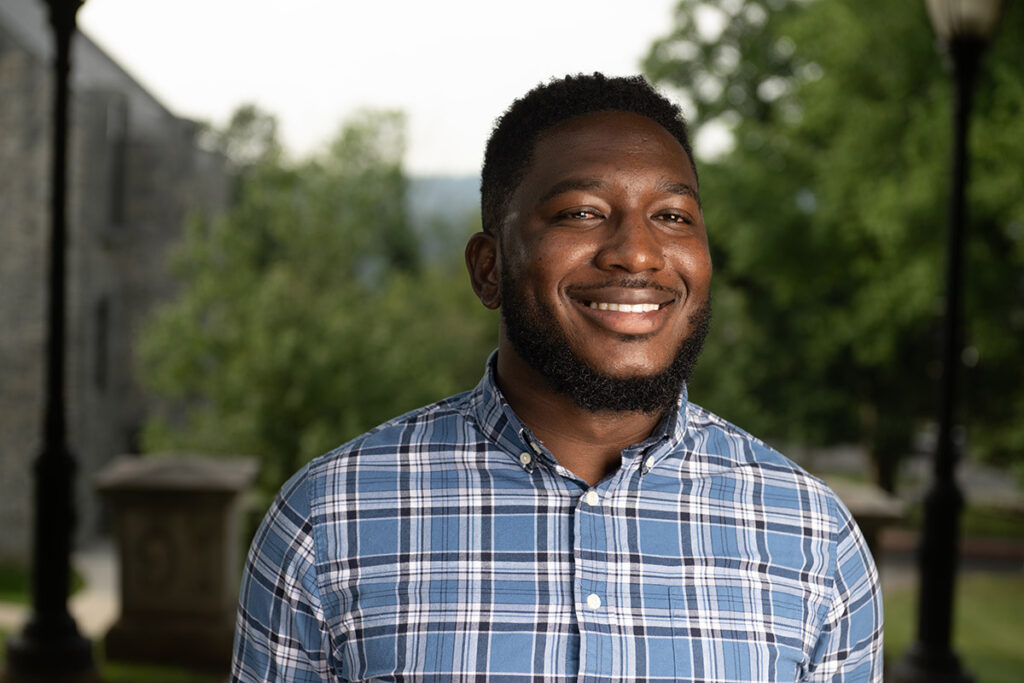Highlighting our faculty
- Faculty at Lafayette College are renowned leaders in their respective fields, exceptional teachers and dedicated mentors. Read more about our faculty.
Meet Abraham Seda, assistant professor of African history

What I study and why: I’m a historian of 20th century southern Africa and the African diaspora. I got interested in history because of the stories that my grandfather told me. He and his friends migrated from colonial Mozambique to Rhodesia in the early 1950s to look for better employment opportunities. He told stories of walking long distances on foot, how they evaded capture by Portuguese patrol officers along the way, and how migrant communities in Rhodesia pooled resources to help each other in times of need. These stories got me very interested in further exploring larger questions about settler colonialism, sport under colonial rule, African diaspora communities within Africa, and colonial labor regimes. I am particularly interested in examining how the field of play became a critical site of the colonial encounter, and how colonized Africans used recreational spaces to contest colonial domination. Sport is intensely political, and my research seeks to understand how it has often reproduced prejudice even when framed as egalitarian and apolitical, especially within the British empire.
What I will be teaching in the fall: I am teaching History of the Modern World (HIST 105) and African History, 1880 to the Present (HIST 214). I’m very excited to teach both courses. The History of the Modern World class introduces students to global events and how different societies were shaped and responded to them. The African History class provides a survey of the continent’s history focussing on themes which include politics, technological innovation, colonial rule, and the rise of African nationalism.
What students can expect from me: As an instructor, I am invested in creating a supportive and collaborative learning environment for students. My pedagogy is shaped by transnational and interdisciplinary approaches. I also encourage students to question the conditions under which knowledge is produced and to think across seemingly established distinctions between the past and the present, or the colonial and the post-colonial. For me, history is more than just about the past, it is also about the practical skills of reading documents critically, weighing the merits of an argument, and assessing the validity of claims made as well as asking if the evidence presented supports those claims. Through in-class activities that include small group discussions, primary source analysis, and engagement with non-textual evidence, students get a chance to test skills acquired in the class. As an interdisciplinary scholar, I seek to understand the past from different perspectives and representations. As such, students can expect to engage with different histories through various mediums such as novels, documentaries, and cultural artifacts.
I’m excited to be here because: I was particularly drawn to Lafayette because of its commitment to a liberal arts education. I’m very passionate about teaching and engaging with students from different backgrounds and intellectual influences. My personal and professional development was the result of collaborations and mentorship by faculty with whom I still maintain meaningful relationships. Lafayette was the perfect fit. When I visited the College for my campus interview, I was very intrigued by the conversations and interactions that I had with the students I met. The entire experience was very pleasant and exciting; it made my decision to join Lafayette very easy.
Getting to know me: I’m a huge football/soccer fan, and I enjoy cooking a lot. These two activities take up most of my time when I am not in the classroom or doing research.
Continue reading to meet more of Lafayette’s newest faculty members.